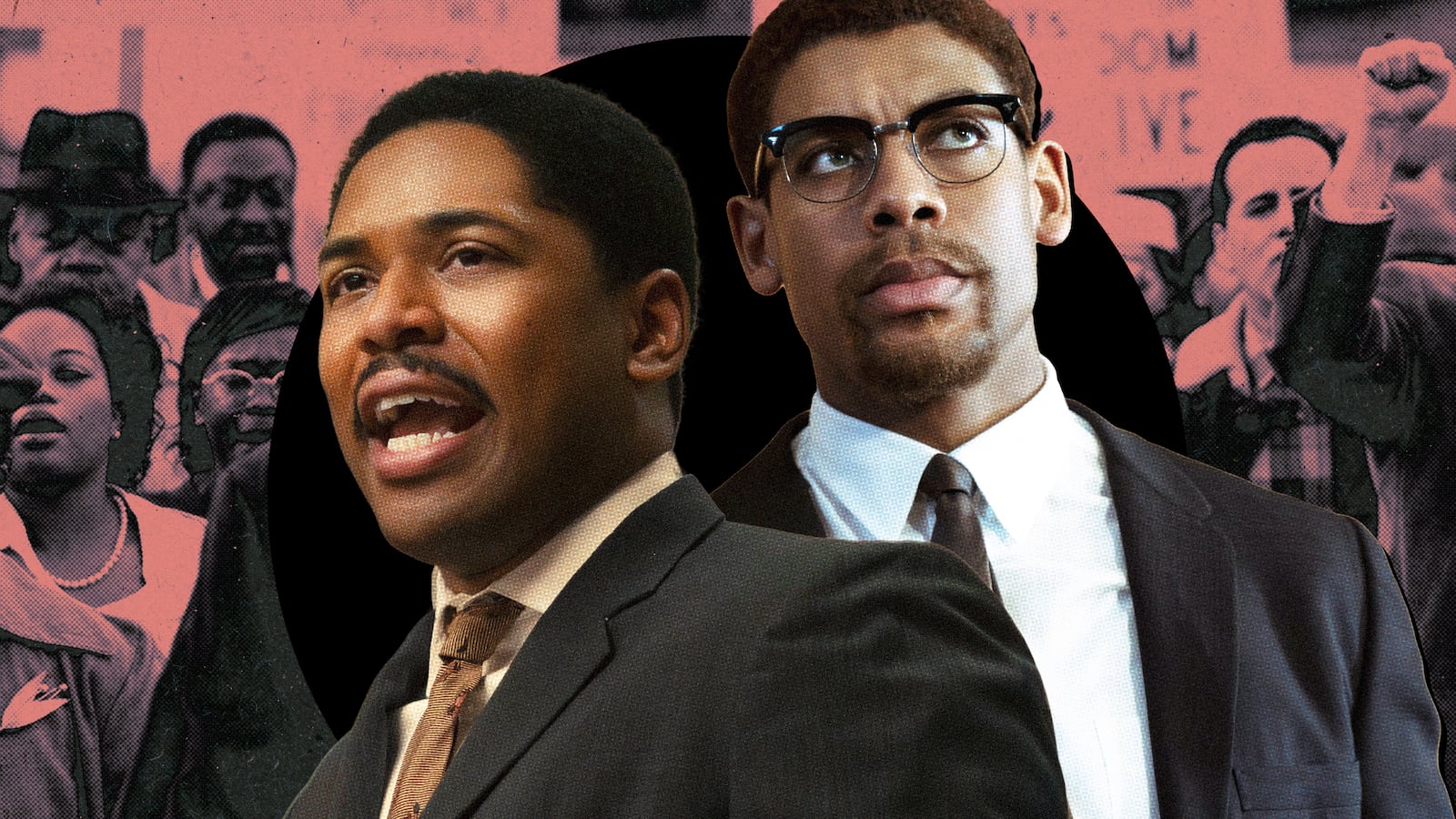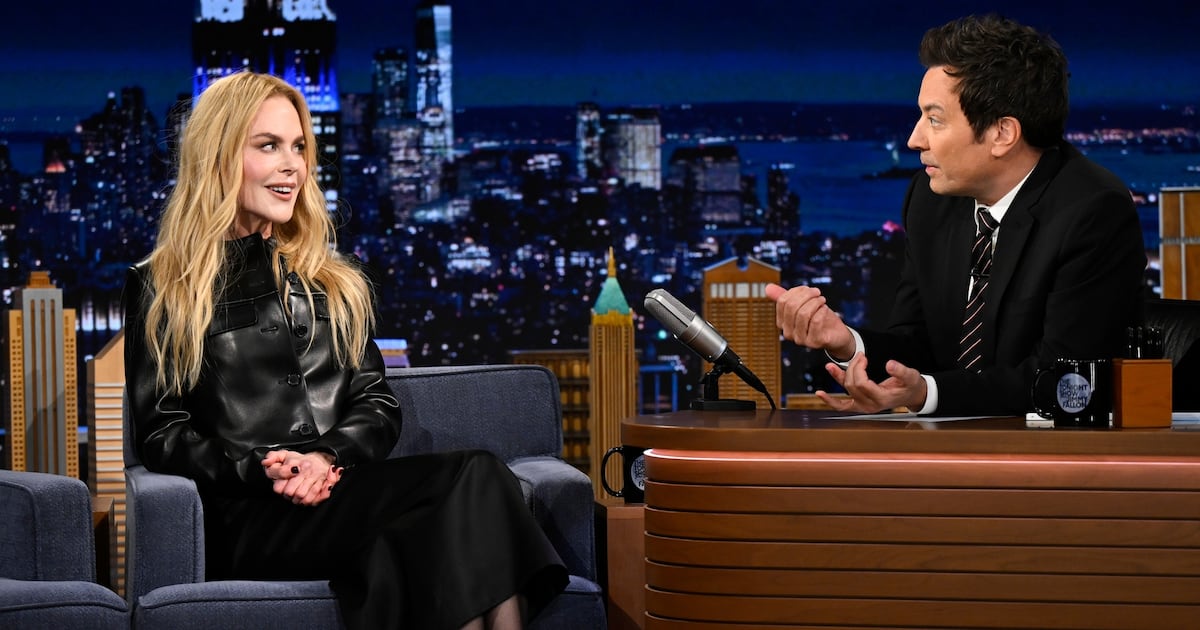Dr. Martin Luther King Jr. and Malcolm X met exactly one time. The two giants of the American Civil Rights movement coincidentally crossed paths on Capitol Hill as they waited for a press conference on the 26th of March, 1964. Less than a year later, Malcom X would be murdered—shot 21 times in his chest, shoulder, arms, and legs at the Audubon Ballroom in Washington Heights. Four years after that, an assassin would come for Dr. King.
That brief, fateful encounter is the starting point of Genius: MLK/X (premiering Feb. 1 on National Geographic). The fourth season of the biographical anthology series, which previously explored the lives of Einstein, Picasso, and Aretha Franklin, follows two men who have often been portrayed as diametrically opposed. King was a middle-class, highly-educated proponent of non-violence who would deliver perhaps the most beloved speech of the 20th century, declaring “I have a dream” at the March on Washington in 1963. Malcolm X, by contrast, had more humble roots and was simplified, by the public eye, into the more militant of the pair, embracing Islam and a by-any-means necessary approach. To hear popular culture tell it, they couldn’t be much different in temperament and tactics. Of course, the truth is more complicated.
After that dramatized meeting of the minds, Genius flashes back to the parallel origins of the activists, unspooling a history lesson of forceful father figures, infighting within the NAACP and Nation of Islam, and violence against Black Americans. We meet the two as young men, with Aaron Pierre (Brother) as X and Kelvin Harrison Jr. (Chevalier) as King. At first, they appear to be occupying opposite ends of a spectrum, and are willing to openly criticize each other. X even goes as far as labeling King a “20th-century Uncle Tom.”
But did they really see the world so differently? The great writer and activist James Baldwin once wrote—his words artfully immortalized in the documentary I Am Not Your Negro—of “two men from unimaginably different backgrounds” who gradually found their positions “driven closer and closer together,” until “they had become virtually the same position.” Over the course of its eight episodes, Genius depicts that drift, showing how X and King’s paths diverged and intersected. Or as Baldwin put it, “It could be said indeed that Martin picked up Malcolm’s burden, articulated the vision that Malcolm begun to see and which he paid for with his life.”
Unlike Baldwin, the writers of Genius don’t offer their two cents, content to relay events in a matter-of-fact, dispassionate fashion with performances that are fastidiously faithful to their subject’s mannerisms. When recounting the legacies of two men who changed the world despite never seeing their 40th birthdays, there was probably no real need to gild the lily. But the show’s respectful, conservative remove results in a greatest hits of iconic public moments. The dialogue and performances are perpetually cranked to 10, Martin and Malcolm on a near-permanent pulpit, delivering pithy wisdom in deep baritones and between pregnant pauses.

Aaron Pierre as Malcolm X.
Richard DuCree/NatGeoThe ambition to sanctify is understandable. But the series grows more didactic as it goes, and it underutilizes the talents of its leads. Pierre and Harrison Jr. are phenomenal when embodying their subject's raw magnetism. But unlike Denzel Washington and David Oyelowo, who delivered celebrated performances in the same roles, they’re rarely given the space to show us anything beyond the charismatic public-facing persona.
What is refreshing is the space afforded to Betty Shabazz (Jayme Lawson) and Coretta King (Weruche Opia), too often cast as glamorous assistants in the cultural imagination. The two actresses afford their characters complexity and fortitude. “The world is not going to make it easy for you to go beyond what you think you should be,” Coretta’s mother tells her. But in 2024, in a TV series produced by Gina Prince Bythewood, it’s now possible to view these women as more than grieving widows.

Hubert Point-Du Jour as Ralph Abernathy, Kelvin Harrison Jr. as Martin Luther King Jr., and Anwar Ali as Andrew Young.
Richard DuCree/NatGeoWhile Genius is a handsome lecture (going beyond generous casting choices that rival Dominic West as Prince Charles in The Crown), it’s a lecture nonetheless. To that end, it will be most illuminating to those wanting to learn all about two of the most significant Black figures of the 20th century, whose impactful lives were brought to a cruel conclusion, but not before they changed the trajectory of American and indeed human history. Even a square, plainspoken reminder of their shared ambitions speaks truth to power.






